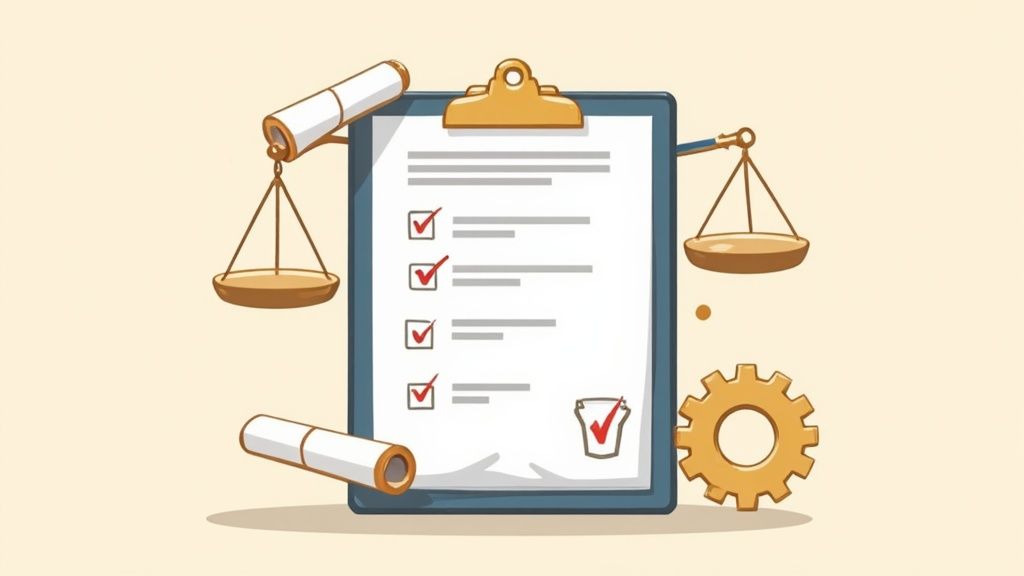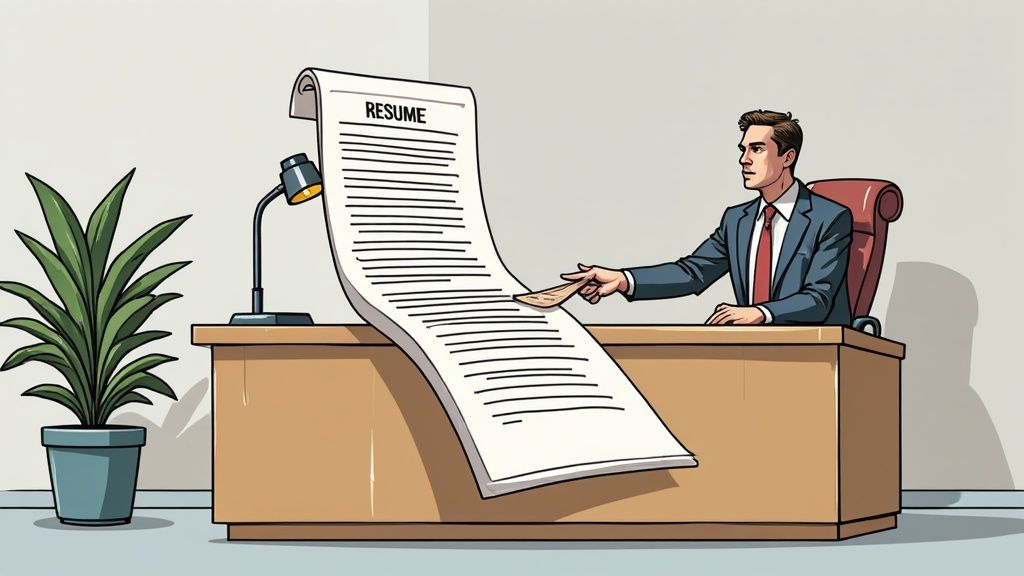
 19 minutes read
19 minutes read
Alright, let's be real. You’re probably sick of typing "paralegal jobs phoenix arizona" into a search bar and getting hit with a tidal wave of copy-paste job postings that all sound the same. It's time to cut through the noise. This is your insider's guide to what’s actually happening in the Phoenix legal market—a scene that's sizzling for reasons that have nothing to do with the 110-degree asphalt.

If you've been on the hunt for more than five minutes, you know the drill. Sifting through dozens of nearly identical listings feels like a full-time job in itself. Hope you enjoy spending your afternoons fact-checking resumes, because that’s now your job. We’re skipping the fluff and giving you the ground-truth on the landscape—from the salary numbers they don't want to advertise to the skills that make hiring managers actually sit up and pay attention.
The truth is, Phoenix is a fantastic place to build a paralegal career, but that means the competition is fierce. You aren't just up against other locals; you're competing with a steady stream of pros moving to the Valley for its booming economy and, let's be honest, the lack of snow. Having the basic qualifications on paper just isn’t enough anymore.
So, what’s driving all this opportunity? It’s a perfect storm of economic growth that creates a constant, nagging need for sharp legal support.

Here's the bottom line: You can't just spam your resume into the void and cross your fingers. That's a rookie move. You need a targeted strategy, one built on what Phoenix employers actually need, not just what their HR department put in the job description.
Before we go deeper, let's get a quick snapshot of the market. This isn't abstract data; it's your new reality.
| Metric | Key Finding |
|---|---|
| Active Job Openings | Consistently 195 to 227+ listings on platforms like Indeed at any time. |
| Top Practice Areas | Corporate Law, Litigation, Real Estate, and Family Law show high demand. |
| Key Industries | Healthcare, Technology, and Construction are major drivers of legal work. |
| Essential Credentials | Paralegal certification is often used as a primary screening tool by firms. |
The picture is clear: the jobs are there, but you've got to be sharp enough to grab one.
Don't just take my word for it. A quick search on a platform like Indeed.com regularly shows between 195 to 227 available paralegal roles at any given moment. These aren't just entry-level gigs; we're talking everything from high-stakes corporate litigation to sensitive family law cases.
Of course, most of these roles require the basics: solid legal research, drafting pleadings like a pro, and managing deadlines like your life depends on it. But what separates the top candidates from everyone else? Having the right credentials from day one.
While on-the-job experience is gold, many firms use certifications as a quick-and-dirty filter to thin the herd. To get a handle on what they're looking for, it’s a good idea to review the common https://hireparalegals.com/paralegal-certification-requirements/.
Okay, time to stop guessing and start strategizing. Let's dig in.
Let's get straight to the point: money. Every job description is intentionally vague, but you need real numbers. Googling a generic salary is useless when you’re staring at an offer letter, wondering if they’re lowballing you. We’re going to break down what paralegals are really earning in Phoenix, because your paycheck should never be a mystery.
Forget those national averages. The Phoenix market has its own pulse. We're talking about the huge gap between a freshly-minted certificate and the kind of cash a seasoned expert in a hot practice area can command. It’s not about one number; it's about knowing the levers that add real dollars to your bank account.
This infographic gives you a snapshot of the key market indicators you need to know.

The data tells a simple story: solid demand is meeting a respectable salary base. This is exactly the kind of environment where you can build a real career, not just have a job.
So, what does this look like on the ground? The latest data shows the average annual salary for a Phoenix paralegal is floating around $59,538, which breaks down to about $28.62 per hour.
But "average" is a trap. The real story is in the range, and it’s a wide one. I've broken down the data so you can see where you fit.
| Experience Level / Percentile | Approximate Annual Salary |
|---|---|
| Entry-Level (25th Percentile) | $47,800 |
| Mid-Career (50th Percentile) | $59,538 |
| Experienced (75th Percentile) | $68,300 |
| Top-Tier (90th Percentile) | $79,741 |
(Source: Data compiled from recent Phoenix salary reports on ZipRecruiter)
That $20,500 difference between the 25th and 75th percentiles is where your career strategy kicks in. It’s a massive signal that there is serious room to grow based on your experience, your skills, and who you work for. It’s not just about tenure; it’s about making smart moves.
Thinking your salary is just based on years of experience is a classic rookie mistake. In a market like Phoenix, specialization is what puts a premium on your time. Simply put, some practice areas are just more lucrative.
Here’s what really moves the needle:

The lesson? Don't be a jack-of-all-trades. Becoming a master of one—especially a profitable one—is the fastest way to climb the Phoenix paralegal salary ladder.
Knowing these numbers is your ammunition. When you walk into a negotiation, you're not just asking for more money. You're demonstrating that you understand the local market and your specific value in it.
Come prepared to explain why you deserve to be at the high end of that range. Did you manage a document review that saved your last firm a boatload in vendor costs? Did your expertise help close a complex deal ahead of schedule? Quantify it. Frame your experience as a series of wins, not just a list of duties.
That’s how you turn an average offer into a great one.

Let’s get one thing straight. Every job description asks for a “detail-oriented team player.” Groundbreaking, right? That’s corporate-speak for "has a pulse." We have to look past the buzzwords to figure out what Phoenix law firms and in-house legal departments actually want.
Forget the generic fluff. We’re decoding the unwritten requirements—the specific skills and software fluency that get your resume moved from the "maybe" pile to the “must interview” stack. Because hoping for the best isn’t a strategy; it’s a lottery ticket.
The Phoenix legal market is a mix of massive national firms, scrappy litigation boutiques, and sprawling in-house departments for the tech and healthcare giants calling the Valley home.
Knowing who's who is step one in targeting your search for paralegal jobs in Phoenix, Arizona. The constant economic hum means certain practice areas are always hiring. If you're looking for opportunity, these are the fields to watch:
You’ll see the big names—Snell & Wilmer, Fennemore Craig, Lewis Roca—but don’t ignore the powerful mid-sized firms or the boutique shops in Scottsdale that focus on lucrative niches. The key is to look past the logo and understand the work they do.
This is where we get to the good stuff. The job description lists the basics, but the hiring manager has a secret wish list. After years in the trenches, I can tell you what’s on it.
They don't just want someone who can perform tasks; they want someone who solves problems before they happen. They want a paralegal who anticipates the attorney's needs, manages deadlines with an almost obsessive level of organization, and communicates with surgical precision.

A great paralegal doesn't just check boxes. They own their cases, protect their attorneys from logistical nightmares, and make the whole practice more profitable. That’s the person who gets hired and promoted.
So, how do you prove you’re that person? It comes down to showing off specific, high-value skills. Forget listing "Microsoft Office." That's like bragging you know how to use a fork.
Here’s what truly matters to Phoenix employers:
Firms are hiring for a mix of technical competence and practical intelligence. Show them you have the foresight and initiative to be indispensable, and you’ll find the best paralegal jobs in Phoenix, Arizona are well within your reach.
If your main strategy for finding top paralegal jobs in Phoenix, Arizona is just hitting 'Apply Now' on repeat, I've got some tough news. You're shouting into a canyon and hoping an echo brings back a job offer. That reactive approach is exhausting and rarely lands the best roles.
The reality? A huge slice of the best jobs are filled before they ever hit a public job board. They’re snapped up through referrals and recruiter connections. To get those roles, you have to get in front of real people, not just a faceless application system.
It's time to shift from being a passive applicant to a strategic professional.
I get it. "Networking" sounds like a stuffy buzzword for forced small talk over bad coffee. But in the surprisingly small Phoenix legal community, it’s the single most important thing you can do for your career. One good conversation is worth a hundred blind applications.
Here’s how to do it right:

Think of it this way: your resume tells them what you’ve done, but networking shows them who you are. In a field built on trust, the latter carries more weight.
For paralegals with some experience, a great legal recruiter is a game-changer. These people have deep relationships with Phoenix firms and often hear about unadvertised openings first. They become your personal advocate and inside source.
Be picky, though. Find a specialist who lives and breathes the Phoenix legal market, not a general staffing agent. Search for recruiters focused on legal support staff in Arizona and set up a quick intro call.
Want to get your foot in the door before a job even exists? The informational interview is your golden ticket. It's a low-pressure way to build a connection and make sure you're the first person they think of when a position opens up.
Here's the play:
The aim is to build a relationship, not beg for a job. Do this consistently, and you'll build a powerful network of advocates. That’s how you get hired beyond the job boards.

So, you’ve seen the job description. It mentions "drafting pleadings" and "assisting with discovery." That’s about as helpful as a car manual telling you to "drive the car." What does a day actually look like?
Let's get one thing straight: this isn't what they teach you in a textbook. This is the real-world rhythm of managing chaos and being the person who keeps the legal machine from grinding to a halt. It’s less about theory and more about navigating the beautiful mess of a busy law practice.
The first thing you learn is that your calendar is your bible. And most of the time, it feels like it's on fire.
A typical morning might start with wrestling the Maricopa County Superior Court's e-filing system into submission—a system with quirks you’ll come to know and… tolerate. By 10 AM, you could be drafting discovery responses, fielding calls from a frantic client, and prepping an attorney for a deposition.
It’s a high-stakes balancing act. Drop one ball—miss one deadline—and you create a real problem for the case. This is the core of the job. The Maricopa County Bar Association notes that Phoenix paralegals are deeply involved in everything from research to filing. To get the official take, you can review their official overview on maricopabar.org.
You don't go into this fight unarmed. Every firm has its preferred tech stack, and knowing your way around it isn't optional. I hope you enjoy learning new software, because you’ll be doing it constantly.
Here’s a look at the typical arsenal:

A paralegal who needs their hand held with technology is a liability. The one who masters the firm’s software becomes the go-to problem solver. Be that person.
Here’s what the job description leaves out: the immense pressure and the need for constant critical thinking. The best paralegals don’t just follow a to-do list; they anticipate what's next. They read an attorney's email and see the three tasks that weren't asked for but are absolutely necessary.
You become a proofreader, an investigator, a project manager, and sometimes, a therapist for anxious clients. You are the connective tissue holding the case together. It’s demanding, often stressful, and requires a level of meticulousness that borders on obsessive.
It's a tough role, no doubt. But for the right person, it's also incredibly rewarding. To get a broader perspective, check out our deep dive on what it's like to work as a paralegal in the modern legal world. This is the reality behind the bullet points—and knowing it is your biggest advantage.
Alright, let's cut to the chase. You've got questions about landing a paralegal job in Phoenix, and I’m here to give you straight answers, not corporate-speak. This is the no-fluff FAQ where we tackle what you’re really thinking.
Let me be blunt: while Arizona doesn't mandate certification, trying to get hired without one is like showing up to a gunfight with a strongly worded letter. You're playing on hard mode.
The market here is competitive. For most reputable firms, a certificate from an ABA-approved program is their first filter. It’s the fastest way for them to shrink a giant pile of applications down to a manageable size.
Can you get by with a decade of amazing experience as a legal assistant? Maybe. But if you're newer to the field, that certificate is your price of admission. It tells firms you know the fundamentals, saving them the time and risk of training you from scratch. Don’t give them an easy reason to toss your resume.
If you want job security, follow the money and the lawsuits. Based on the sheer volume of postings, litigation is king in Phoenix. This city is a major business hub, and where there's business, there are disagreements.
That said, don't sleep on real estate and corporate law. With the Valley's relentless growth, paralegals who can handle complex property deals and manage corporate governance are incredibly valuable. The smartest move you can make is to pick one of these high-demand areas and become a true specialist.
I’ll make this simple: it’s everything. The Phoenix legal community seems massive from the outside, but it’s a surprisingly tight-knit world. I'd bet a huge percentage of the best paralegal jobs are filled through referrals before they ever get posted online.

Getting involved with organizations like the Maricopa County Bar Association's Paralegal Division isn't just for your resume. It's about meeting the senior paralegals and attorneys who are the gatekeepers to your next job. One good conversation at an event is worth more than a hundred blind applications.
When you click "Apply," you're just another PDF in a folder. When you shake someone's hand, you're a person. Guess which one they'll remember?
This depends on where you are in your career. For an experienced paralegal, a good legal recruiter is an absolute game-changer. They aren’t just blasting your resume out; they’re your personal agent.
The top recruiters have deep relationships with Phoenix firms and often hear about exclusive positions that are never advertised. They can advocate for you, help you navigate salary negotiations, and give you honest feedback. It’s like having a secret weapon.
For entry-level candidates, it’s a tougher sell. Recruiters get paid by firms to find candidates with a proven track record. If you have at least 2-3 years of solid experience in a specific, in-demand field, connecting with a reputable Phoenix-based legal recruiter is a smart move. If you’re just starting out, your time is better spent on direct applications and networking first.
Finding the right legal talent shouldn't feel like a lottery. At HireParalegals, we connect US law firms with a curated network of over 10,000 pre-vetted remote paralegals, legal assistants, and junior attorneys. Cut your hiring time to just 24 hours and reduce payroll costs by up to 80% with top-tier professionals ready to make an immediate impact. Learn more about building your dream team at https://hireparalegals.com.